小学六年级英语总复习(三)词组归纳
人教PEP版丨六年级英语上册第三单元知识点预习总览(单词、句型、重点短语)

人教PEP版丨六年级英语上册第三单元知识点预习总览(单词、句型、重点短语)Unit3My weekend plan(一)、词汇四会next week/weekend下周/周末newspaper报纸this morning今天上午comic book漫画书Time this afternoon今天下午word book单词书(时间)this evening今天晚上this weekend这个周末dictionary字典tonight今夜tomorrow明天post card明信片take a trip去旅游theme park主题公园activities see a film看电影others pet shop宠物店(活动)go to the supermarket去看电影(其他)supermarket超市visit my grandparents参观祖父母shoe store鞋店二、重点句式和句型:本单元中出现的一个重点语法是一般将来时:表示将要发生的动作或状态,常和表示将来的时间连用。
构成:陈述肯定句:主语+be going to+动词原形+其他例子I am going to(go to)the bookstore by bus this afternoon.He/She is going to take a trip by train this weekend.We/They are going to see a film tonight.否定句:主语+be+not going to+动词原形+其他例子I am not going to(go to)the bookstore by bus this afternoon.He/She is not going to take a trip by train this weekend.We/They are not going to see a film tonight.一般疑问句:Be+主语+going to+动词原形+其他?例子:Are you going to the bookstore by bus this afternoon?Yes,I am.No,I’m not.Is he/She going to take a trip by train this weekend?Yes, he/She is.No,he/She isn’t.Are we/they going to see a film tonight?Yes,we/they are. No,we/they aren’t.特殊疑问句:特殊疑问词+一般疑问句?例子:What are you going to do this afternoon?Where are you going this afternoon?How are you going to the bookstore this afternoon?When are you going to the bookstore by bus?(以上特殊疑问句中are you可以替换为is he,is she,are they,are we 等)三、重点句型:1.we’re going to see a film about space trael!我们将要去看关于火星之旅的电影。
PEP人教版小学六年级毕业班英语复习资料(三至六年级)
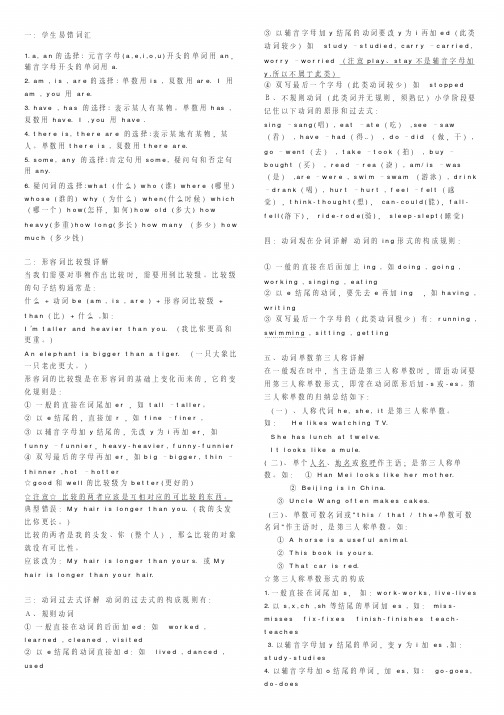
一:学生易错词汇1.a,a n的选择:元音字母(a,e,i,o,u)开头的单词用a n,辅音字母开头的单词用 a.2.a m,i s,a r e的选择:单数用i s,复数用ar e.I用a m,y o u用a r e.3.h a v e,h a s的选择:表示某人有某物。
单数用h as,复数用h a v e.I,y ou用h a v e .4.t h e r e i s,t h e r e a r e的选择:表示某地有某物,某人。
单数用t h e r e i s,复数用t h e r e a r e.5.s o m e,a n y的选择:肯定句用s o m e,疑问句和否定句用a n y.6.疑问词的选择:w h a t(什么)w h o(谁)w h e r e(哪里) w h o s e(谁的)w h y(为什么)w h e n(什么时候)w h i c h (哪一个)h o w(怎样,如何)h o w o l d(多大)h o wh e a v y(多重)h o w l o n g(多长)h o w m a n y(多少)h o w m u c h(多少钱)二:形容词比较级详解当我们需要对事物作出比较时,需要用到比较级。
比较级的句子结构通常是:什么+动词b e(a m,i s,a r e)+形容词比较级+t h a n(比)+什么,如:I’m t a l l e r a n d h e av i e r t h a n y o u.(我比你更高和更重。
)A n e l e p h an t i s b i g g e r t h a n a t i g e r.(一只大象比一只老虎更大。
)形容词的比较级是在形容词的基础上变化而来的,它的变化规则是:①一般的直接在词尾加e r,如t a l l–t a l l e r。
②以e结尾的,直接加r,如f i n e–f i n e r,③以辅音字母加y结尾的,先改y为i再加e r,如f u n n y–f u n n i e r,h e a v y-h e a v i e r,f u n n y-f u n n i e r④双写最后的字母再加e r,如b i g–b i g g e r,t h i n–t h i n n e r,h o t–h o t t e r☆g o o d和w e l l的比较级为b e t t e r(更好的)☆注意☆比较的两者应该是互相对应的可比较的东西。
六年级英语上册Unit3重点知识归纳总结

六上Unit3重点知识姓名:________________ 班级:_______________一、重点词组1.来自be from=come from2.love living...喜欢住在...3.去电影院go to the cinema4.与...玩play with5.出生was/were born6.现代化城市modern city7.拥挤的街道crowded street 8.搬到move to9.是怎样be...like 10.彼此each other二、重点句型1. Where are you from? 你来自哪里?I am from New York City in America. 我来自美国纽约市。
2. What is the New York like? 纽约怎样?It’s a big and modern city but it’s quite noisy.它是一个很大的现代化城市,但是它很吵闹。
3. Everything is very expensive in NewYork.每样东西在纽约都很贵。
三、重点语法1.Where are you from?= Where do you come from? 你来自哪里?I am from New York City in America.= I come from New York City. 我来自美国的纽约市。
注意:be from和come from 的固定搭配。
不能说I am come from China.2. What is the New York like? 纽约怎样?注意:be....like 是一种固定用法,意思是“是怎样”,类似的句型有:What is the weather like? What is your father like?3.go to the cinema = go to the moves 看电影go to + 名词表示去某地或做某事go to the park go to the farm go to school go to workgo to the hospital go to the zoo go to sleep4. each other 互相They always help each other.5. play with + 名词玩耍……; 和……玩Play with water play with a toy car play with my brother人称代词和物主代词的用法1)I often help him. 2)I give an apple to him. 主格宾格主格宾格3)My father likes them. 4) These are our school bags.形主形主主格做主语,放在动词前面,宾格做宾语,放在动词和介词后面。
苏教版六年级英语6BUnit3第三单元短语、词汇、知识点梳理知识汇总知识归纳总结资料

苏教版六年级英语(下)6B U n i t3第三单元短语、词汇、知识点梳理知识汇总知识归纳总结资料(总3页)--本页仅作为文档封面,使用时请直接删除即可----内页可以根据需求调整合适字体及大小--六下Unit3单元知识点语法一 .规则变化的名词一般情况加s 清辅音后读/s/ desk-desks, map-maps浊辅音后和元音后读/z/ girl-girls , car-cars以s,sh,ch,x 等结尾加es 读/iz/ box-boxes, class-classes ,watch-watches以ce,se,ze 等结尾加s 读/iz/ license-licenses以辅音字母+y 结尾变y 为i 再加es 读/iz/ party-parties, family-families二.其他复数的规则变化1)以y结尾的专有名词或元音字母+y 结尾的名词变复数时,直接加s变复数。
例如:读/z/ day-days, key-keys2)以o 结尾的名词,变复数时:a. 加s,如: photo---photos , piano---pianosb. 加es,如:potato—potatoes, tomato--tomatoesc. 上述a和b两种方法均可,如zero---zeros / zeroes.3)以f或fe 结尾的名词变复数时:a. 加s,如: belief---beliefs , roof---roofsb. 去掉f, fe 加ves ,如:half---halves , knife---knivesc. 上述a和b两种方法均可,如handkerchief: handkerchiefs / handkerchieves. 三.不规则变化名词复数的1)child---children ,foot---feet, tooth---teeth注意::由一个词加 man 或 woman构成的合成词,其复数形式也是 -men 和-women,如an Englishman, two Englishmen.但German 不是合成词,故复数形式为Germans2)单复同形,如deer, sheep, fish, Chinese, Japanese ,等。
六年级英语总复习资料 知识点

复习(1)形容词和副词的比较级和最高级比较级:二者之间进行比较的叫比较级比较级结构••主语+谓语+形容词(副词)比较级+than+...表示“…比更…”最高级:三者或三者以上进行比较叫最高级最高级结构:主语+谓语+(the)+形容词/副词最高级+in/of短语表示“……是……中最……的(地)‘一、形容词、副词的比较级和最高级的变化规则一般单音节词,1.比较级在后面加-er,最高级在后面加-est如:small--smaller--smallest2.以不发音字母e结尾的,比较级在后面加-r,最高级在后面加-st: 如:large—larger —largest nice—nicer—nicest3.以一个元音和一个辅音结尾的重读闭音节单词.先双写末尾的辅音字母,比较级加-er,最高级加-est; big—bigger-biggest .以“辅音字母+y”结尾的单词,变y改为i,比较级加-er,最高级加-est;如:easy—easier一easiest busy—busier—busiest多音节单词和部分双音节单词的比较级是在单词前加more,最高级是在单词前加most beautiful—more beautiful—most beautiful形容词最高级前必须加定冠词the,副词最高级前加不加都行。
二、+规别变化good /well —better—bestbad/i11—worse—worstmuch/many—more—most little …less--leastfar----farther/further—farthest/furthest old—older/elder-oldest/eldest 越来越…单音节词:比较级and比较级多单节词•• more and more原形6.最高级中的of和in的区别of后面跟的是同类的人或事物,in后面跟地点或时间一、人称代词主格宾格形容词性物主代词名词性物主代词I我me我my我的mine我的you你you你your你的yours你的he他him他his他的his他的she她her 她her她的hers她的it它it它its它的its它的we我们us我们our我们的ours我们的you你们you你们your你们的yours你们的they 一them their theirs他她它们他她它们他她它们的他她它们的主格放在句首做主语,宾格放在句中,做宾语。
小学英语六年级下学期unit3单词、短语、句型、语法

⼩学英语六年级下学期unit3单词、短语、句型、语法六英下U3(知识点)词汇表healthy 健康的diet饮⾷a little⼀点a few ⼏个at a time ⼀次cola 可乐need 需要vegetable 蔬菜porridge 粥steamed bun 馒头western 西⽅的cereal ⾕类,麦⽚meal (⼀顿)饭、餐sausage ⾹肠词组短语1.like eating sweets and ice cream喜欢吃糖和冰激凌2.like drinking water喜欢喝⽔3.drink a little water every day每天喝⼀些⽔4.have some bread and milk for breakfast早餐吃⾯包喝⽜奶5.for lunch and dinner对于早餐和午餐6.have a lot of rice吃许多⽶饭7.some fish⼀些鱼⾁8.have a few eggs every week每周吃⼏个鸡蛋9.have a healthy diet有⼀个健康的饮⾷10.have a lot of noodles for breakfast早餐吃许多⾯条11.eat an egg吃⼀个鸡蛋12.eat some meat and some vegetables吃⼀些⾁和⼀些蔬菜13.only eat a little rice只吃⼀些⽶饭14.like sweet food喜欢甜⾷15.eat a little at a time每次吃⼀点16.eat some fruit吃⼀些⽔果17.in the afternoon and evening在下午和晚上18.the following words下⾯的单词19.some potatoes⼀些⼟⾖20.many tomatoes许多西红柿21.get out出去22.Chinese people中国⼈23.have some porridge喝些粥24.steamed buns馒头25.western people西⽅⼈26.have cereal and sausage for breakfast早饭吃⾕类和⾹肠27.have to go to the supermarket不得不去超市28.want to come with me想要和我⼀起来29.see some drinks看见⼀些饮料30.take a small bottle拿⼩瓶的31.drink too much cola喝太多可乐32.want this big fish想要这只⼤鱼33.need a lot of rice需要许多⽶饭34.take the big bag拿⼤包的35.go home回家36.too heavy太重37.have a rest休息38.in a healthy diet在⼀个健康的饮⾷中39.have some meat and fish in your meals在吃饭时吃些⾁和鱼40.eat only a little sweet food只吃⼀点甜⾷句型1.What do you have for breakfast? 你早饭吃什么?/doc/0380fbdd284ac850ad0242c1.html k is good for your body. ⽜奶对你的⾝体有益。
英语六年级下第三单元
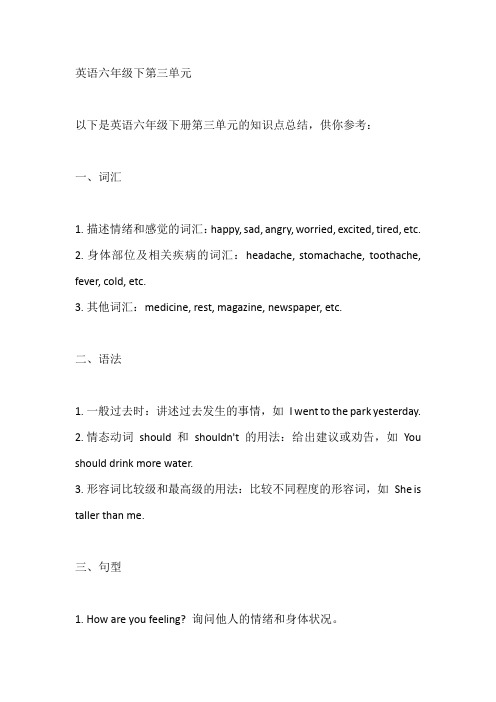
英语六年级下第三单元
以下是英语六年级下册第三单元的知识点总结,供你参考:
一、词汇
1.描述情绪和感觉的词汇:happy, sad, angry, worried, excited, tired, etc.
2.身体部位及相关疾病的词汇:headache, stomachache, toothache, fever, cold, etc.
3.其他词汇:medicine, rest, magazine, newspaper, etc.
二、语法
1.一般过去时:讲述过去发生的事情,如I went to the park yesterday.
2.情态动词should 和shouldn't 的用法:给出建议或劝告,如You should drink more water.
3.形容词比较级和最高级的用法:比较不同程度的形容词,如She is taller than me.
三、句型
1.How are you feeling? 询问他人的情绪和身体状况。
2.What's the matter? 用于询问他人的问题或困扰。
3.I'm sorry to hear that. 表达对他人困扰的同情和关心。
四、阅读理解
1.理解故事和文章中的主要情节和人物情感。
2.提取关键信息,回答问题。
五、写作
1.描述自己或他人的情绪和身体状况。
2.写关于健康生活方式的建议。
以上是第三单元的主要知识点总结,但请注意不同教材版本可能会有所差异。
人教版六年级英语上册期末知识点分类复习与检测-Unit3(含答案及听力材料)

六年级上英语期末知识点分类复习与检测-Unit 3【知识梳理】一、熟记重点单词和词组:1.动词词组:visit grandparents看望祖父母 see a film看电影 take a trip去旅游 go to the supermarket去超市2.表示将来的时间词语:this morning今天上午 this afternoon今天下午 this evening今天晚上 tonight在今晚 tomorrow明天 next week下周3.书籍类的词语:dictionary字典词典 comic book连环画册 word book单词本postcard明信片二、牢记重点句型:1. ---What are you going to do tomorrow? 你明天打算做什么?---I’m going to have an art lesson. 我要上美术课。
2. ---Where are you going? 你们打算去哪儿?---We’re going to the cinema. 我们打算去电影院。
3. ---When are you going? 你们什么时候去?---Next Monday. 下周一。
三、熟读下列句子:1. What are you going to do in your lesson? 你打算在课上做什么?2. We’re going to draw some pictures in Renmin Park.我们要在人民公园画画。
3. I have to do my homework now.我现在不得不做作业了。
四、语法链接:本单元为一般将来时态,要用be going to 结构。
“be going to +动词原形”构成一般将来时态,表示计划、安排将要做的事或根据目前推测将要发生的动作,意为“打算,将要”。
过关检测Listening Part(共35分)一、听录音,圈出你所听到的单词。
六年级英语上册 人教PEP版 期中复习 单词专题 (三)

四会词汇
5.evening ['iːvnɪŋ] 晚上; 傍晚 考点:① 复数:evenings②this evening今天晚上 ;in the evening在晚上 易错:字母e/ng的发音。 巧记:e-ven-ing
四会词汇
6.tonight [tə'naɪt] 今晚 考点:主要用作为副词、名词,作副词时译 为“在今晚,今夜”,作名词时译为“今晚,今 夜”。 易错:字母o的发音,字母i /gh的发音 巧计:to-n-igh-t
Practice
Guess what place it is.
hospital
Practice
Guess what place it is.
cinema
Practice
Guess what place it is.
museum
Practice
Guess what place it is.
post office
四会词汇
lesson ['les(ə)n]课 space [speɪs] 太空 travel ['træv(ə)l] (尤指长途)旅行 half [hɑːf] 一半 复数:halves price [praɪs] 价格
四会词汇
Mid - Autumn Festival中秋节 together [tə'geðə] 一起 get together mooncake ['mu:nkeɪk] 月饼 poem ['pəʊɪm] 诗 moon [muːn] 月亮
a.
b.
c.
d.
Exercises 四、按要求写单词。
we 宾格 us
poem 汉译英 诗
人教版六年级英语上册第三单元知识点归纳(飞)
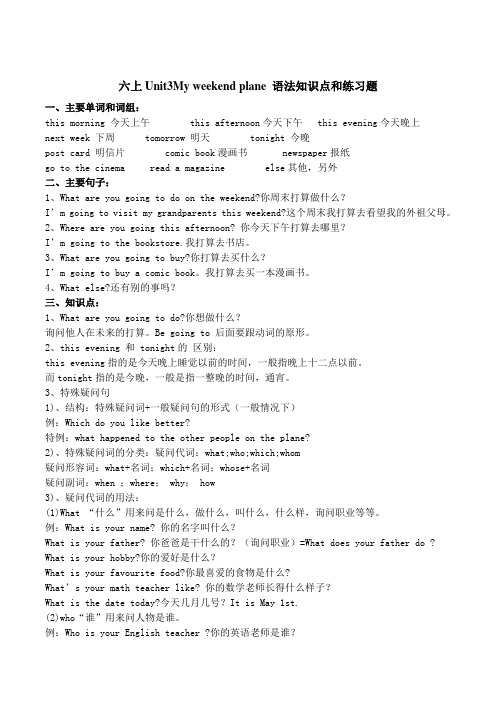
六上Unit3My weekend plane 语法知识点和练习题一、主要单词和词组:this morning 今天上午 this afternoon今天下午 this evening今天晚上next week 下周 tomorrow 明天 tonight 今晚post card 明信片 comic book漫画书 newspaper报纸go to the cinema read a magazine else其他,另外二、主要句子:1、What are you going to do on the weekend?你周末打算做什么?I’m going to visit my grandparents this weekend?这个周末我打算去看望我的外祖父母。
2、Where are you going this afternoon? 你今天下午打算去哪里?I’m going to the bookstore.我打算去书店。
3、What are you going to buy?你打算去买什么?I’m going to buy a comic book。
我打算去买一本漫画书。
4、What else?还有别的事吗?三、知识点:1、What are you going to do?你想做什么?询问他人在未来的打算。
Be going to 后面要跟动词的原形。
2、this evening 和 tonight的区别:this evening指的是今天晚上睡觉以前的时间,一般指晚上十二点以前。
而tonight指的是今晚,一般是指一整晚的时间,通宵。
3、特殊疑问句1)、结构:特殊疑问词+一般疑问句的形式(一般情况下)例:Which do you like better?特例:what happened to the other people on the plane?2)、特殊疑问词的分类:疑问代词:what;who;which;whom疑问形容词:what+名词;which+名词;whose+名词疑问副词:when ;where; why; how3)、疑问代词的用法:(1)What “什么”用来问是什么,做什么,叫什么,什么样,询问职业等等。
小学六年级英语必备词组
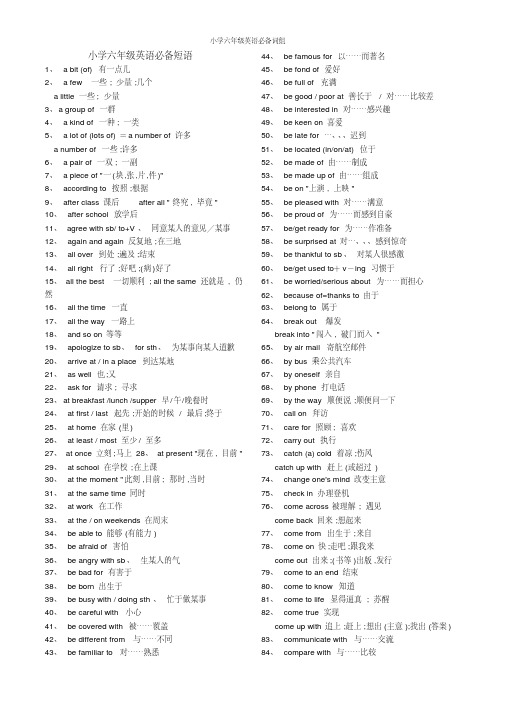
小学六年级英语必备短语1、 a bit (of) 有一点儿2、 a few 一些; 少量;几个a little一些; 少量3、a group of 一群4、 a kind of 一种; 一类5、 a lot of (lots of)=a number of 许多a number of 一些;许多6、 a pair of 一双; 一副7、 a piece of "一(块,张,片,件)"8、according to 按照;根据9、after class 课后after all "终究, 毕竟"10、after school 放学后11、agree with sb/ to+V、同意某人的意见/某事12、again and again 反复地;在三地13、all over 到处;遍及;结束14、all right 行了;好吧;(病)好了15、all the best 一切顺利; all the same 还就是, 仍然16、all the time 一直17、all the way 一路上18、and so on 等等19、apologize to sb、for sth、为某事向某人道歉20、arrive at / in a place 到达某地21、as well 也;又22、ask for 请求; 寻求23、at breakfast /lunch /supper 早/午/晚餐时24、at first / last 起先;开始的时候/ 最后;终于25、at home 在家(里)26、at least / most 至少/ 至多27、at once 立刻;马上28、at present "现在, 目前"29、at school 在学校;在上课30、at the moment "此刻,目前; 那时,当时31、at the same time 同时32、at work 在工作33、at the / on weekends 在周末34、be able to 能够(有能力)35、be afraid of 害怕36、be angry with sb、生某人的气37、be bad for 有害于38、be born 出生于39、be busy with / doing sth、忙于做某事40、be careful with 小心41、be covered with 被……覆盖42、be different from 与……不同43、be familiar to 对……熟悉44、be famous for 以……而著名45、be fond of 爱好46、be full of 充满47、be good / poor at 善长于/ 对……比较差48、be interested in 对……感兴趣49、be keen on 喜爱50、be late for …、、、迟到51、be located (in/on/at) 位于52、be made of 由……制成53、be made up of 由……组成54、be on "上演, 上映"55、be pleased with 对……满意56、be proud of 为……而感到自豪57、be/get ready for 为……作准备58、be surprised at 对…、、、感到惊奇59、be thankful to sb、对某人很感激60、be/get used to+v-ing 习惯于61、be worried/serious about 为……而担心62、because of=thanks to 由于63、belong to 属于64、break out 爆发break into "闯入, 破门而入"65、by air mail 寄航空邮件66、by bus 乘公共汽车67、by oneself 亲自68、by phone 打电话69、by the way 顺便说;顺便问一下70、call on 拜访71、care for 照顾; 喜欢72、carry out 执行73、catch (a) cold 着凉;伤风catch up with 赶上(或超过)74、change one's mind 改变主意75、check in 办理登机76、come across 被理解; 遇见come back 回来;想起来77、come from 出生于;来自78、come on 快;走吧;跟我来come out 出来;(书等)出版,发行79、come to an end 结束80、come to know 知道81、come to life 显得逼真; 苏醒82、come true 实现come up with追上;赶上;想出(主意);找出(答案)83、communicate with 与……交流84、compare with 与……比较congratulate …on…祝贺……85、cover an area of 占地面积86、cut down 砍倒87、deal with 处理88、depend on "依靠,依赖"89、die of 因……病而死different from 与……不同90、do one's best 尽最大努力91、do sb、 a favour 帮某人忙92、do some shopping 买东西(cleaning)93、do with 处置, 处理94、dream of 梦见95、dress up 穿着打扮96、each other 互相97、eat up 吃光, 吞噬earn one’s life 谋生either… or…或者……或者……98、enjoy oneself 过得愉快99、enter for 报名参加even if / thought 即使;尽管100、fall off 从…、、、跌落101、far away (from) (离)遥远far from远离feel like doing 想要……;感觉要……102、fill in "填充, 填写"fill … with …用……填充103、find out 找出;查明;了解104、finish off 吃完; 喝完first of all 首先105、for ever 永远106、for example 例如107、for the first time 第一次108、for the time being "暂时,眼下"from … to…从……到……109、from door to door 挨家挨户110、from now on 从此以后; 今后111、from time to time 不时;有时112、get along / on (with) 进展;与……、相处go away 逃离113、get back 返回114、get in 进入;收集115、get in the way 挡道116、get off 下车117、get on 上车get on with与……、相处118、get ready for 为……作准备119、get rid of 摆脱120、get tired of 对……感到厌倦121、get to 到达get together 相聚; 联欢122、get up 起床123、give back 归还;送回124、give out 分发125、give sb、 a hand 助某人一臂之力126、give up 放弃127、go ahead 先走;向前走;去吧;干吧go away 走开;离去128、go shopping / bowling 去购物/ 打保龄球129、go for a swim 去游泳go for a walk 散步130、go home 回家131、go in for 参加;从事于;酷爱132、go on 继续133、go on a diet 实行节食134、go on a picnic 去野餐135、go on with / doing sth、继续做某事136、go out 熄灭137、go over 复习;仔细地再读一遍138、go sightseeing 去观光139、go to (the) hospital 去医院(瞧病)140、go to bed 就寝141、go to college 上大学142、go to school 上学143、go to sleep 入睡144、go to the cinema / movie(s) 去瞧电影145、go up 走上前去146、go wrong 出错147、grow up 成年;长大148、had better 最好还就是;还就是……好149、hand in 上交hand out 分发150、happen to do 碰巧做151、happen to sb、发生到某人身上have fun with玩得高兴have fun doing…玩得高兴152、have (got) to 不得不153、have a class / lesson 上课154、have a good time 玩得很愉快;过得很愉快155、have breakfast 吃早餐156、have no idea 不清楚157、have pity on sb、怜悯某人158、have sports 进行体育活动159、hear from 收到……来信160、hear of 听说161、help sb、with sth、帮助某人做某事help oneself to …请随便吃点……162、here and there 到处163、hold a meeting 举行会议164、hold on 等一等(别挂电话)165、hold one's breath 屏住呼吸166、hold up 举起167、huge amounts of 大量的hundreds of 几百;成百上千168、hurry off 匆忙离开hurry up 赶快;快点169、in a hurry 匆忙; 很快地170、in a minute 一会儿in a word 简言之; 总之171、in addition 另外172、in all 总共173、in charge of "主管,负责"in danger 处于危险状态174、in English 用英语175、in fact 事实上;实际上176、in front of 在……前面177、in hospital 住院178、in line 成一排;成一直线179、in no time 立刻180、in one's fifties 在某人五十多岁时181、in one's opinion 根据某人瞧法182、in order 按顺序in order to 为了in other words 换句话说183、in return 作为回报184、in surprise 惊奇地in public 当众;公开in surprise 吃惊;惊讶185、in the end 最后;终于186、in the future 在将来187、in the middle of 在……中间188、in the years to come 在即将来临的几年里189、in this way 这样190、in time 及时instead of 代替;而不就是191、in trouble 处于困境中192、instead of 代替;而不就是193、join in 参加;加入194、just a minute 等一下195、just now 现在;刚才196、keep doing sth、继续做某事197、keep fit 保持健康keep one’s word 守信198、keep、、、from 使……不做199、keep in touch (with) (与……)保持联系200、keep off 阻挡;不让……接近201、keep quiet 保持安静202、keep sb、busy 让某人忙个不停203、knock over 撞倒;撞翻204、later on 过后;后来205、laugh at 嘲笑206、lay the table (饭前)摆好餐具207、learn…from 向……学习208、leave (secondary) school (中学)毕业209、leave a message 留个口信210、leave for 动身去211、less / more than 少于/ 多于212、let out 放出213、line up 整队; 排成行214、listen to 听……(讲话)215、live on 靠……为生216、look after 照料;照顾look down upon 瞧不起;轻视217、look at 瞧;观瞧218、look for 寻找219、look forward to+V-ing 期待着220、look like 瞧上去象;显得221、look out of 从……朝外瞧222、look up 查寻; 抬头瞧223、lose one's way 迷路224、lose weight 减肥225、make a face 做鬼脸;做苦脸make a film 拍电影226、make a fire 生火227、make a living 谋生228、make a mistake 出差错;犯错误229、make a noise 弄出声230、make friends with 与……交朋友231、make fun of 拿…、、、开玩笑232、make money 挣钱;赚钱233、make the/one's bed 整理床铺234、make out 辨认出235、make progress 取得进步236、make up one's mind 下决心237、meet the needs of 迎合……的需要238、meet with 遭遇239、more or less 或多或少neither… nor…既不……也不……next to 紧挨着; 紧靠着240、no longer / not …any more/longer 不再241、not…at all "(用来加强语气)一点也不,根本不"not only …but also…不仅……而且……not so…as 不像……;不如……not till / until …直到……才……242、now and then /again 时而; 偶而243、of course 当然244、of one's own 属于某人自己的245、on business "有事, 出差"246、on duty 值日;值班on foot 步行;走路247、on holiday 在休假248、on one's side 在某人一边249、on show 在展出250、on the other hand 另一方面251、on the phone 在听电话252、on the right 在右边253、on the/one's way (to) 在去……的路上254、on time 准时255、on weekdays 在工作日256、once a day 每天一次once again 在一次257、once every four years 每四年一次258、once more 再次259、once upon a time 从前;很久以前one after another "一个接一个,连续地"260、one another 互相261、operate on sb、为某人动手术262、out of 从……里出来; 缺乏263、out of work 失业out of date 过时264、over and over 再三; 一遍又一遍265、over there 在那边266、pass by 经过pay for 付…、、、钱; 买267、pick out 挑选出268、pick up 拾起269、play a trick on 捉弄270、play with 玩弄271、plenty of 许多272、point at 指向;指着273、point out 指出274、praise sb、for sth、为某事表扬某人275、prefer…to (比起……来)更喜欢276、prepare for 准备277、protect…from 保护……免受prevent …from…妨碍;防止;预防278、pull down 推倒279、put down 记下put off 延期; 推迟280、put on 穿; 戴上;上演281、put out 伸出; 扑灭282、put up 举起; 挂起283、rely on 依靠284、right now "立刻,马上"285、ring up 打电话给……run after 追捕;追踪286、run away 逃跑run out of 用完287、save one's life 挽救某人生命288、search for 搜寻; 搜查289、see…off 为……送行290、sell out 售完291、send for 派人去叫……292、separate … from 分开293、set free 释放;解放293、set off 动身;启程;使爆发294、set out 出发;开始295、show off 炫耀296、so far 到目前为止297、so…that 太……以至于……298、sooner or later 迟早;早晚299、speed up 加快速度300、spend …on 在……花钱301、stand for 代表302、stop doing sth、停止做某事(不再做……) 303、stop to do sth、停下来做某事(开始做……) 304、such as 例如305、take away 拿走306、take it easy 别着急;别紧张307、take off 脱下;起飞308、take one’stime 从容;别紧张309、take out 取出310、take place 发生311、talk about 谈论;议论312、the day after tomorrow 后天313、the day before yesterday 前天314、the more… the more 越……就越……315、the other day 前几天;某日316、think about 考虑(就是否去做) 317、think of 想起;考虑;认为;瞧法318、thousands of 成千上万;几千319、throw away 扔掉320、too…to…太……以至于不……321、try on 试穿;试试瞧322、try out 试验323、turn down 关小;调低324、turn off 关掉(水、电视、收音机等) 325、turn on 打开(水、电视、收音机等) 326、turn over 翻动;梨翻(土地) 327、turn up 到达;来到;开大(声音等) 328、up and down 上下,来回329、used to do sth、过去常常330、wait for 等候,等待331、wake up 醒来332、work out 算出, 解决333、worry about 担心,烦恼334、write down 写下,记下335、write to 写信给……。
unit3单元知识归纳(苏教版六年级英语单元复习)
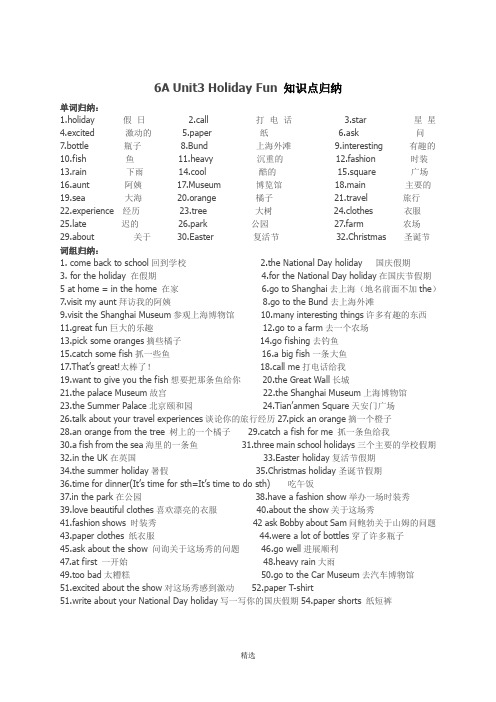
6A Unit3 Holiday Fun 知识点归纳单词归纳:1.holiday 假日2.call 打电话3.star 星星4.excited 激动的5.paper 纸6.ask 问7.bottle 瓶子8.Bund 上海外滩9.interesting 有趣的10.fish 鱼11.heavy 沉重的12.fashion 时装13.rain 下雨14.cool 酷的15.square 广场16.aunt 阿姨17.Museum 博览馆18.main 主要的19.sea 大海20.orange 橘子21.travel 旅行22.experience 经历23.tree 大树24.clothes 衣服te 迟的26.park 公园27.farm 农场29.about 关于30.Easter 复活节32.Christmas 圣诞节词组归纳:1. come back to school回到学校2.the National Day holiday 国庆假期3. for the holiday 在假期4.for the National Day holiday在国庆节假期5 at home = in the home 在家 6.go to Shanghai去上海(地名前面不加the)7.visit my aunt拜访我的阿姨8.go to the Bund去上海外滩9.visit the Shanghai Museum参观上海博物馆10.many interesting things许多有趣的东西11.great fun巨大的乐趣12.go to a farm去一个农场13.pick some oranges摘些橘子14.go fishing去钓鱼15.catch some fish抓一些鱼16.a big fish一条大鱼17.That’s great!太棒了!18.call me打电话给我19.want to give you the fish想要把那条鱼给你20.the Great Wall长城21.the palace Museum故宫22.the Shanghai Museum上海博物馆23.the Summer Palace北京颐和园24.Tian’anmen Square天安门广场26.talk about your travel experiences谈论你的旅行经历27.pick an orange摘一个橙子28.an orange from the tree 树上的一个橘子29.catch a fish for me 抓一条鱼给我30.a fish from the sea海里的一条鱼31.three main school holidays三个主要的学校假期32.in the UK在英国33.Easter holiday复活节假期34.the summer holiday暑假35.Christmas holiday圣诞节假期36.time for dinner(It’s time for sth=It’s time to do sth) 吃午饭37.in the park在公园38.have a fashion show举办一场时装秀39.love beautiful clothes喜欢漂亮的衣服40.about the show关于这场秀41.fashion shows 时装秀42 ask Bobby about Sam问鲍勃关于山姆的问题43.paper clothes 纸衣服44.were a lot of bottles穿了许多瓶子45.ask about the show 问询关于这场秀的问题46.go well进展顺利47.at first 一开始48.heavy rain大雨49.too bad太糟糕50.go to the Car Museum去汽车博物馆51.excited about the show对这场秀感到激动52.paper T-shirt51.write about your National Day holiday写一写你的国庆假期54.paper shorts 纸短裤1.句子归纳:2.What did you do for the holiday? 你假期干了什么?3.I went to Shanghai and visited my aunt. 我去了上海拜访我的阿姨。
(完整版)人教版六年级英语上册第三单元知识点归纳(飞)
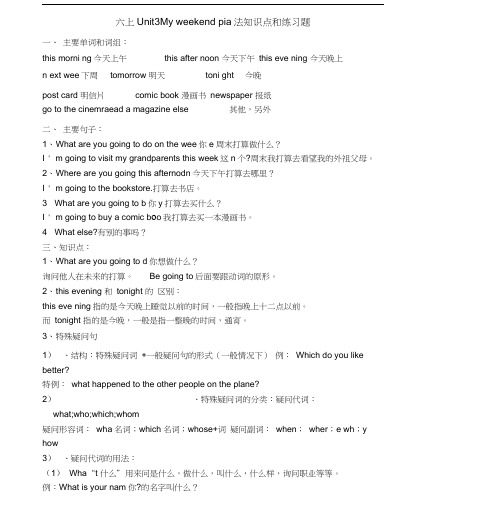
六上Unit3My weekend pia法知识点和练习题一、主要单词和词组:this morni ng今天上午this after noon 今天下午this eve ning 今天晚上n ext wee下周tomorrow 明天toni ght 今晚post card 明信片comic book 漫画书newspaper 报纸go to the cinemraead a magazine else 其他,另外二、主要句子:1、W hat are you going to do on the wee你e周末打算做什么?I ' m going to visit my grandparents this week这n个?周末我打算去看望我的外祖父母。
2、W here are you going this afternodn今天下午打算去哪里?I ' m going to the bookstore.打算去书店。
3 What are you going to b你y打算去买什么?I ' m going to buy a comic b o o我打算去买一本漫画书。
4 What else?有别的事吗?三、知识点:1、W hat are you going to d你想做什么?询问他人在未来的打算。
Be going to后面要跟动词的原形。
2、t his evening 和tonight 的区别:this eve ning指的是今天晚上睡觉以前的时间,一般指晚上十二点以前。
而tonight 指的是今晚,一般是指一整晚的时间,通宵。
3、特殊疑问句1)、结构:特殊疑问词+一般疑问句的形式(一般情况下)例:Which do you like better?特例:what happened to the other people on the plane?2)、特殊疑问词的分类:疑问代词:what;who;which;whom疑问形容词:wha名词;which名词;whose+词疑问副词:when;wher;e wh;y how3)、疑问代词的用法:(1)Wha“t 什么”用来问是什么,做什么,叫什么,什么样,询问职业等等。
人教版小学六年级英语总复习资料-18页精选文档

人教版小学六年级英语总复习资料人教版小学六年级英语总复习资料 ,3-6年级句子单词,三年级上册单词黑体字(73个单词)pen pencil pencil-case book bag ruler eraser crayon sharpener schoolhead face nose mouth eye ear arm hand finger leg foot body red yellow green blue purple white black orange pink brown cat dog monkey panda rabbit ducksquirrel mouse elephant pig bird bear cake bread hot dog hamburger chicken French friesCoke juice milk water tea coffee one two three four five six seven eight nine ten doll ball boat kite balloon car plane 三年级下册单词黑体字,72个单词、词组,boy girl teacher student this my friend nice good morning goodafternoon meet goodbye too I’m=Iamfather dad mother mom man woman grandmother grandma grandfather grandpa sister brother let’s=letus really great and howeleven twelve thirteenfourteen fifteen sixteen seventeen eighteen nineteen twenty how many can lookat peach pear orange watermelon apple banana grape strawberry like some thanks bus bike taxi jeepdesk chair walkman lamp your zoosmall big long short tall giraffe deer四年级上册单词黑体字,66个单词、词组,window board light picture doorfloor classroom computer wall fan teacher’s desk Chinese book Englishbook math book schoolbag story-book notebook twenty-one thirty thirty-one forty forty-one fifty long hair shorthair thin strong quiet friend(s) music science sports computer game painting study bathroom bedroom living kitchen phone bed sofa shelf fridge table rice fish noodles beef vegetable soup knife chopsticks spoon plate fork family parents uncle aunt babydriver doctor farmer nurse baseball player 四会单词,36个,bag pencil pen book ruler pencil-case teacher student boy girl friend home room school classroom window desk door chair bed rice beef bread milk egg waterchicken fishsister brother father mother driver doctor farmer nurse四年级下册单词黑体词,50个单词、词组,playground garden teacher’s desk canteen art room computerroom washroom music roomgym TV room lunch English class music class breakfast dinner P.E. class get up go to school go home go to bed sweater jeans pants socks shoes shorts hot weather rainy windy cloudy colourfulpretty cheap expensive sneakers slippers sandals boots sheep hen lamb goat cow tomato cucumber potato onion carrot 四会单词,88个, computer board fan light this is my that your teacher’sdesk picture wall floor yes it one two three four five six seven eightnine ten what time it’s o’clock mathChinese English P.E. music for classjacket shirt skirt dress T-shirt redblue yellow green white no not colourwarm cold cool today jeans pant socks shoes let’s play football snowy sunny how much big small long short applebanana pear orange watermelon are theyhorse aren’t cat rabbit pig duck dogeleven twelve thirteen fifteen twenty how many there 五年级上册单词黑体字,16个单词、词组,principal university student cabbage pork mutton empty the trash put away the clothes air-conditioner over in front of sky cloud mountain village city四会单词、词组,93个,young funny tall strong kind old short thin who’s=whois Mr what’s=what is like he’s=he is strict smart active quiet she’s=sheis very but Monday Tuesday Wednesday Thursday Friday day have on Saturday Sunday do homework watch TV read books What about…? Too eggplant fish greenbeans tofu potato tomato for lunch we tasty sweet sour fresh saltyfavourite they’re=they are fruit don’t=do not grape cook the meals waterthe flowerssweep the floor clean the bedroom make the bed set the table wash the clothes do the dishescan’t=cannot use a computer curtain trashbin closet mirror end table bedroom kitchen bathroom livingroom in on under near behind clothes riverflower grass lake forest path parkpicture house bridge tree road building clean五年级下册单词黑体字,18个,January February March April May JuneJuly August September October NovemberDecember first second third fourth fifth Eighth ninth twelfth twentieth 四会单词、词组,83个,do morning exercises eat breakfast have English class play sports eat dinner when eveningget up at usually noon climb mountains go shopping play the piano visit grandparentsgo hiking weekend often sometimes spring summer fall winter season which best swimfly kites skate make a snowman plant trees why because sleep Jan. Feb. Mar. Apr. May June July Aug.Sept. Oct. Nov. Dec. birthday uncle her datedraw pictures cook dinner read a book answer the phone listento music clean the roomwrite a letter write an e-mail mom grandpa studyfly jump walk run swim kangaroosleep climb fight swing drink water take pictures watch insects pick up leavesdo an experiment catch butterflies honey count insects collect leaves write a report play chess have a picnic六年级上册单词黑体字,16个,plane ship subway science museum northsouth east west tonight tomorrowtake a trip read a magazine go to the cinema magazinedictionary vapour 四会单词、词组,71个,by foot bike bus train how go to school traffic traffic light traffic rule stop wait get to library post office hospital cinema bookstore where please nest to turn right left straight then next week this morning this afternoon this evening comic book post card newspaper buy hobby ride a bike dive play the violin make kites collectstamps live(s) teach(es) go(es) watch(es)read(s) doesdoesn’t=doesnot singer writer actor actressartist TV reporter engineer accountant policeman salesperson cleaner where work raincloud sun stream seed come from soil sprout plant should then 六年级下册单词四会单词,25个,taller shorter stronger older younger biggerheavier longer thinner smaller have a fever hurt have a cold have a toothache have a headache have a sore throat matter sore nose tired excited angry happy bored sad三年级上册句子读下列句子,写出中文意思.1. Hello! ___________ Hi! _____________________________2. Hello! I’m Wu Yifan. I’m fromChina.__________________________3. What’s your name?_______________________________________4. My name’s Chen Jie. ______________________________________5. I have a pencil. ____________________ Metoo._________________ 6. Good morning._______________ Good afternoon._______________ 7. This is Miss White. _____________Nice to meet you. ____________ 8. Where are you from? ____________ I’m from America.___________9. Let’s go to school. __________________ OK.,,,,,,,,10. . How many cakes? ____________________One cake.__________11. How are you? ________________I’m fine, thankyou._____________12. Let’s paint. _________________Great.________________________13. I like green._________________ Me too.______________________ 14. I have a rabbit.___________________________________________ 15. Cool! ________ Super!_________ Great!________ Wow!_________ 16. May I have a look? ___________________Sure. _________________ 17. Here you are._________Thank you. __________You’re welcome18. I like hamburgers._______________ Me too.___________________ 19. Have some French fries.____________________________________ 20. Can I have some chicken?____________________Sure. __________ 21. How old are you?____________________ I’m nine. ____________三年级下册句子1. Where are you from? I’m from America.2. Good morning! Good afternoon!3. Class, we have a new friend today.4. Who’s that woman? She’s my mother。
Unit3必备知识(复习讲义)六年级英语上册(人教PEP版)

—We are going to the cinema.我们打算去电影院。
3.—When are you going?你们什么时候去?
—Next Wednesday.下周三。
4.I have to do my homework now.现在我不得不要做我的作业了
13. do homework做作业14. have to必须;不得不
15. this morning今天早晨16. this afternoon今天下午
17. this evening今天晚上18. go ice-skating去滑雪
19. make a snowman堆雪人20. go for a picnic去野餐
21. be afraid of...害怕...... 22. Mid-Autumn Festival中秋节
23. comic book连环画册
必背句型
四会
1.—What are you going to do tomorrow?你明天打算做什么?
—I’m going to have an art lesson.我要去上美术课。
31.听起来不错
32.做作业
33.必须;不得不
34.今天早晨
35.今天下午
36.今天晚上
37.去滑雪
38.堆雪人
39.去野餐
40.害怕......
41.中秋节
42.连环画册
二、句子
1.—你明天打算做什么?
—我要去上美术课。
2.—你们打算去哪?
—我们打算去电影院。
3.—你们什么时候去?
—下周三。
4.现在我不得不要做我的作业了。
[全]人教六年级上册英语第三单元考点知识点汇总(单词.词组.句型)
![[全]人教六年级上册英语第三单元考点知识点汇总(单词.词组.句型)](https://img.taocdn.com/s3/m/a044e08e312b3169a551a461.png)
人教六年级上册英语第三单元考点知识点汇总(单词.词组.句型)Unit 3单词1.必背动词短语:go ice-skating去滑冰wash clothes洗衣服draw pictures画画make a snowman 堆雪人go for a picnic去野餐see a film看电影visit my grandparents看望我的祖父母take a trip 去旅行go to the supermarket 去超市2. 表示将来时间的时间短语:this morning今天上午this afternoon今天下午this evening今天晚上tonight 在今晚tomorrow 明天tomorrow morning 明天上午tomorrow afternoon 明天下午tomorrow evening明天the day after tomorrow后天next week下周next month下个月next year 明年next Monday下周一注:如果表示在上午、下午要用:in the morning in the afternoon但是如果morning这类词前有了修饰词,比如this tomorrow,那么前面就不加介词in!例如:I am going to the supermarket this morning.3. 表示书籍的词:dictionary 字典→(复数)dictionariesan English book一本英语书comic book 连环画册word book单词书postcard明信片story book故事书4. 其他单词词组考点:leaf叶子→(复数)leaves解释:以f或者fe结尾的可数名词复数把f或fe变成v再加es句型1. 一般将来时:表示“打算或计划要做某事”1)构成:be(is, am, are)going to +动词原形will + 动词原形I’m going to draw a picture tonight.2)变成一般疑问句:把be动词提前。
人教(部编版)六年级上册英语第三单元知识点汇总

人教(部编版)六年级上册英语第三单元知识点汇总本文档汇总了人教(部编版)六年级上册英语第三单元的知识点。
该单元主要涵盖了以下内容:1. 单词和词组- 英语单词:apple, banana, cat, dog, elephant, fruit, gorilla, hat,ice cream, juice, key, lion, monkey, nose, orange, panda, queen, rabbit, sandwich, tomato, umbrella, vase, watermelon, xylophone, yogurt, zebra.- 词组:eat an apple, a big banana, a cute cat, a naughty dog, along elephant, a fresh fruit, a funny gorilla, a red hat, an ice cream, a glass of juice, a golden key, a loud lion, a little monkey, a round nose, a juicy orange, a huge panda, a beautiful queen, a jumping rabbit, a tasty sandwich, a ripe tomato, a colorful umbrella, a pretty vase, a sweet watermelon, a musical xylophone, a yummy yogurt, a striped zebra.2. 语法知识- There is/are 句型:用于描述某处存在或有某物。
例如:Thereis an apple on the table. (桌子上有一个苹果。
)- 一般疑问句:通过将助动词提至句首形成疑问句。
例如:Is there a cat in the room? (房间里有一只猫吗?)- 肯定回答:Yes, there is. (是的,有。
毕业升学英语总复习六年级英语复习重点单词短语句子

Unit1一、单词basketball篮球ping-pong乒乓球game比赛sport运动team 球队player运发动runners运动鞋shorts短裤T-shirt T恤衫win赢lose 输throw扔catch接heavy重的light轻的hit 击打need需要or或者badminton羽毛球any一些〔用于肯定句和问句中〕some一些〔用于肯定句中〕soccer〔英式〕足球bought买〔buy的过去式〕taught教〔teach的过去式〕thought 想〔think的过去式〕either也〔用于否认〕too也〔用于肯定〕net 网paddle球拍score比分floor地板yell叫喊二、按要求写单词any〔同义词〕some either〔同义词〕too soccer〔同义词〕football heavy〔反义词〕light catch〔反义词〕throw teach(反义词)learn lose〔反义词〕win hard〔反义词〕easy buy〔过去式〕bought teach〔过去式〕taught think〔过去式〕thought win〔过去式〕wonlose〔过去式〕lost are〔过去式〕were hurt〔过去式〕hurthit〔过去式〕hit go〔过去式〕went can〔过去式〕couldhit〔如今分词〕hitting catch〔三单〕catches easy〔副词〕easily play〔名词〕player teach〔名词〕teacher cook〔名词〕cooker run〔名词〕runner this〔对应词〕that these〔对应词〕those here〔对应词〕there三、英汉互译my favourite sport我最喜欢的运动play ping-pong打乒乓球 a pair of runners一双运动鞋ping—pong balls乒乓球too hard太难too heavy太重hit the ball击打球 a good basketball player一名好的篮球运发动each other彼此buy some things买一些东西 a police officer一名警察on the team在球队中many players许多队员Bob’s team鲍勃的球队 a basketball game一场篮球比赛at the school gym在学校体育馆the other另一个buy snacks买零食jump up and down跳上跳下an orange player一名橙队球员play hard努力地打work hard努力工作play a game打一场比赛Blue Team蓝队四、重点句型1、What did you do this evening?We watched Bob play basketball.今天晚上你们做了什么?我们看了鲍勃打篮球。
陕旅版六年级下册英语单元重点(3)
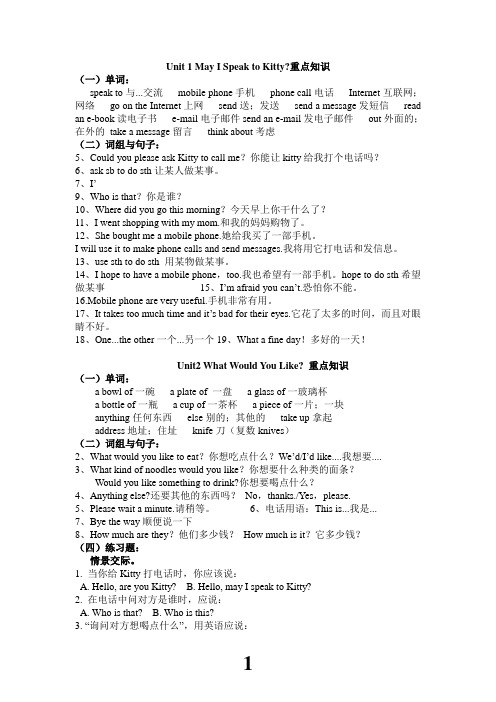
Unit 1 May I Speak to Kitty?重点知识(一)单词:speak to与...交流mobile phone手机phone call电话Internet互联网;网络go on the Internet上网send送;发送send a message发短信read an e-book读电子书e-mail电子邮件send an e-mail发电子邮件out外面的;在外的take a message留言think about考虑(二)词组与句子:5、Could you please ask Kitty to call me?你能让kitty给我打个电话吗?6、ask sb to do sth让某人做某事。
7、I’9、Who is that?你是谁?10、Where did you go this morning?今天早上你干什么了?11、I went shopping with my mom.和我的妈妈购物了。
12、She bought me a mobile phone.她给我买了一部手机。
I will use it to make phone calls and send messages.我将用它打电话和发信息。
13、use sth to do sth 用某物做某事。
14、I hope to have a mobile phone,too.我也希望有一部手机。
hope to do sth希望做某事15、I’m afraid you can’t.恐怕你不能。
16.Mobile phone are very useful.手机非常有用。
17、It takes too much time and it’s bad for their eyes.它花了太多的时间,而且对眼睛不好。
18、One...the other一个...另一个19、What a fine day!多好的一天!Unit2 What Would You Like? 重点知识(一)单词:a bowl of一碗 a plate of 一盘 a glass of一玻璃杯a bottle of一瓶 a cup of一茶杯 a piece of一片;一块anything任何东西else别的;其他的take up拿起address地址;住址knife刀(复数knives)(二)词组与句子:2、What would you like to eat?你想吃点什么?We’d/I’d like....我想要....3、What kind of noodles would you like?你想要什么种类的面条?Would you like something to drink?你想要喝点什么?4、Anything else?还要其他的东西吗?No,thanks./Yes,please.5、Please wait a minute.请稍等。
- 1、下载文档前请自行甄别文档内容的完整性,平台不提供额外的编辑、内容补充、找答案等附加服务。
- 2、"仅部分预览"的文档,不可在线预览部分如存在完整性等问题,可反馈申请退款(可完整预览的文档不适用该条件!)。
- 3、如文档侵犯您的权益,请联系客服反馈,我们会尽快为您处理(人工客服工作时间:9:00-18:30)。
小学六年级英语总复习(三)词组归纳
a : a little(一点) a lot(很,非常), a lot of(许多), lots of(许多,很多) , a bottle of(一盒……), a piece of(一张/片……) , a cup of (一杯……), a glass of(一玻璃杯……), all right(好,行,不错), most of(大部分……), plenty of(很多,大量的)
be: be good for(对于……来说是好的), be bad for(对于……来说是不好的), be going to(将要做……), be good at(在……方面出色), be late for(……迟到), between…and …(在……两者之间) , both…and… (两着都……).
come: come from(来自……), Come in(进来). Come on 过来呀!快来呀) ! Come with me(跟我来)! different from(与……不同), of course(当然)
Do:do one’s homework(做家庭作业), do housework(做家务), do some reading(读书), on duty9(值日), do morning exercises(做早操).
get: get down(下来), get up(起床), get on with(在……方面进展), get home(到家) , get to school(到校)
go: go boating(去划船), go swimming(去游泳), go running(去跑步), go walking(去散步), go shopping(去购物), go skating(去滑冰), go skiing(去滑雪), go fishing(去钓鱼), go sightseeing(去游览,去观光), go climbing(去爬山) , go home(回家), go to school(去上学), go to work(去上班), go straight/down/on/along(一直走), go along(沿着……一直走)
have:have breakfast(吃早餐), have lunch(吃午饭), have supper(吃晚饭), have dinner(吃正餐), have a class(上课), have a look(看一看), have got(有), have a good appetite(有好胃口,食欲强), have a picnic(野餐)
how: how many(多少), how much{多少(用于不可数名词)}, how old(几岁), how often(多久一次)
look: look at(看……) , look like(看起来象), very much(很,非常), in English(用英语)
put: put into(把……放到……), put on(穿上……), put …away…(把……放好/收起来),
take:take (good) care of(好好爱护,关心,照顾,保管), take photos(照相), take a bath(洗澡), take exercise(进行锻炼,进行练习).
动词短语:
fly a kite(放风筝), ride a bike(骑自行车), play a game(做游戏), throw …away(把……扔掉), turn on(开……) , stand up(站起来), sing a song(唱歌), ask a question(问问题), run away(流走,跑走), look forward to(盼望), try to(尝试做…….), be angry with(对……生气), divided by(除以……), come to(合计) , collect coins(收集硬币), climb up to the mountain/hill…(爬到山上) by the way(顺便问问),
time短语:
in the morning(在早上), in the afternoon(在下午), in the evening(在晚上), Good morning/
afternoon/evening/night(早上/下午/晚上好/晚安). for hours(持续……小时), for an hour(持续一个小时), At this time of day(每天的这个时候),five minutes past nine(九点零五分), quarter past nine(九点十五分), quarter to nine(差十五分到九点), all day(整天), on Sunday/Monday/Tuesday/Wednesday/Thursday/Friday/Saturday(在星期天/星期一/星期二/星期三/星期四/星期五/星期六), Mid-autumn Festival(中秋节), Spring Festival(春节), National Day(国庆节), Children’s Day(儿童节), New Year(新年), Women’s Day(妇女节), May Day(劳动节), Teachers’Day(教师节), Party’s Birthday(党生日)
noun短语:
family tree(家族谱), favourite food/ drinks/colour/subject (喜爱的食物) paint brush(画笔), an office worker(一个办公室文员), class teacher(班主任), an old…(一个/件老的/旧的……), years old(…..岁), the high jump(跳高), the long jump(跳远), a map of China/the UK…(一张中国/英国……地图), e-mail address(电子邮箱地址), telephone number(电话号码)
交通手段:
on foot(走路), by bus/car/ship/plane/underground/bike(乘公共汽车/小轿车/轮船/飞机/地铁/自车)
介词短语:
at the beginning of(在……的开始), at the end of(在…..的结尾/结束), at the weekend(在周末), on the weekdays(在工作日), in front of (在…..的前面), in the front of(在……物品内的前面), in the middle of (在……的中间), next to(在……旁边), at the gate of(在……的大门), on the floor(在地板上), on the …( ) floor(在
第几层楼), on the ground floor(在一楼), at home(在家), at school(在学校), over there(那里,那边), in the sun(在阳光下), from…to…(从……到……), turn right/left(向右/左转), on the left(在左边), on the right(在右边), to the east/west/north/south of(在…….的东/西/北/南方), from the left/right(从左/右), kilometers/metres away(离……千米/米远), in Class One(在一班), in Grade Six(在六年级)
句子:
Please say hello to…for me(宾格)/人名{请代(我)向……问好}.
Here it is(是). Here they are(). Here you are(给你).
Nice to meet you(很高兴见到你)! Nothing much(没什么). Not at all(没关系).
Shall we…?{(用于建议)我们……好吗?} I’ll take it(我买了).
It’s time to …(是做……的时候了) It’s time for….(是……的时候了)
Excuse me(对不起,打扰了). See you(再见)! welcome to …(欢迎到……), You’re welcome(别客气).
What about…?(……呢?) How do you do?{你好吗? (用于初次见面,答句相同) How do you like…?(你觉得……怎么样?)
It doesn’t matter.(没关系) That’s a pity.(真糟糕) Never mind!(不要紧) And you? (你呢?)Happy birthday!(生日快乐)
地方建筑:
post office(邮局), police station(警察局), train station(火车站), sports stadium(大型露天运动场), department store(百货商场), kinds of (不同种类), the Children’s Home(少年之家), primary school(小学), middle school(中学)。
